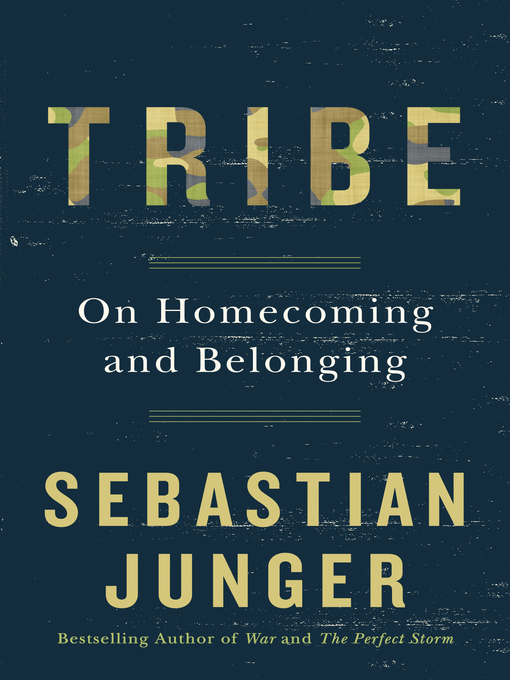
Tribe
On Homecoming and Belonging
کتاب های مرتبط
- اطلاعات
- نقد و بررسی
- دیدگاه کاربران
نقد و بررسی

March 21, 2016
In this small but perfectly lucid book, National Magazine Award–winning journalist Junger (War) meditates on tribal sentiment, how it aids “loyalty and belonging and the eternal human quest for meaning,” and how the disappearance of this sentiment has had toxic consequences for modern societies. During the U.S.’s wars of settlement with its native population, many white men defected to, and many white captives were reluctant to return from, what Junger describes as a Stone Age lifestyle; he wonders why, and suspects that the material benefits of Western culture couldn’t compete with “the intensely communal nature of an Indian tribe,” which was “more or less run by consensus and broadly egalitarian.” In the present day, the close interdependence of a tribal lifestyle and its shared resources are things Westerners only experience in combat situations and disasters. For all the comfort of modern society, Junger thinks, its “profound alienation” has led in America to income inequality, behaviors destructive to the environment, high rates of suicide and mental illness (including PTSD), and rampage shootings. Ending with a look at the country’s divisive political rhetoric, Junger suggests that the U.S. could cure its ills if we could only focus on the collective good. Agent: Stuart Krichevsky, Stuart Krichevsky Literary.

April 1, 2016
A short book with a solid argument about the downside of civilization's progress. The latest from Vanity Fair contributing editor Junger (War, 2010, etc.) mixes memoir, reportage, and historical research into a case for the advantages of the tribe and how connective, communal benefits are lost as society moves toward competition and individuality. The author begins with the early settlement of America, examining how colonists introduced to tribal life, or captured into it, might convert to it, but the process rarely worked the other way. "Indians almost never ran away to join white society," writes Junger. "Emigration always seemed to go from the civilized to the tribal, and it left Western thinkers flummoxed about how to explain such an apparent rejection of their society." The author then makes a leap in his argument that is as provocative as some will find it counterintuitive: how war and catastrophe seem to instill that tribal spirit that individuals have otherwise lost and how the stress of such times serves to improve mental health rather than threaten it. As jarring as conjecture about "the positive effects of war on mental health" might seem, Junger amasses plenty of academic and anecdotal support. From there, he makes another leap, to PTSD, asserting that its prevalence stems less from the traumas of battle than from the difficulties of rejoining a disjointed, divided society after collective tribal bonding. "The problem doesn't seem to be the trauma on the battlefield so much as reentry into society," he writes, showing how PTSD can affect returnees who have never experienced combat. The author resists the temptation to glorify war as the solution to a nation's mental ills and warns against the tendency "to romanticize Indian life," but he does succeed in showing "the complicated blessings of 'civilization, ' " while issuing warnings about divisiveness and selfishness that should resonate in an election year. The themes implicit in the author's bestsellers are explicit in this slim yet illuminating volume.
COPYRIGHT(2016) Kirkus Reviews, ALL RIGHTS RESERVED.

April 15, 2016
Prominent journalist Junger (War, 2010) examines a number of modern institutions to assess their roles in leading people to make individualistic choices rather than acting out the feeling of being competent, necessary members of a tribe or community. Humans now end up feeling isolated and alone, he believes, starting early in life. Unlike hunter-gatherer moms, who stayed close to their babies day and night, mothers are now often away from their infants, who sleep alone. He also observes that people are wired to help each other and risk their lives for complete strangers, but police and fire departments largely eliminate that need. Junger continues his long investigation into war, noting that although it inspires ancient human virtues of courage, loyalty and selflessness, it also does harm, including post-traumatic-stress disorder. He observes, Instead of being able to work and contribute to societya highly therapeutic thing to doa large percentage of veterans are just offered lifelong disability payments. Junger uses every word in this slim volume to make a passionate, compelling case for a more egalitarian society.(Reprinted with permission of Booklist, copyright 2016, American Library Association.)

December 1, 2015
Asking how we overcome trauma and find our place in the world, Perfect Storm author Junger points to our tribal instinct to form small, purposive groups, then to the alienation that characterizes today's society, whereby people don't feel the same need to cooperate. But that kind of small-unit loyalty continues to exemplify the best soldiering, argues Junger, and we have a lot to learn by studying how our veterans react as they return home.
Copyright 2015 Library Journal, LLC Used with permission.

























دیدگاه کاربران